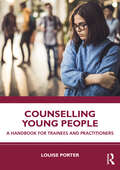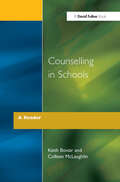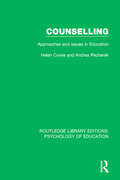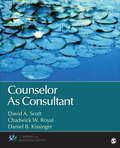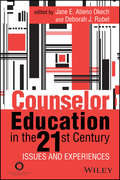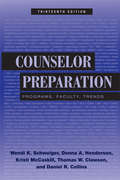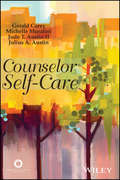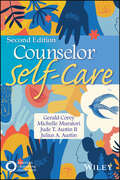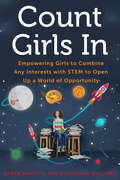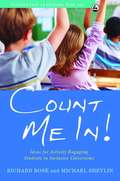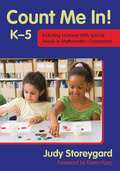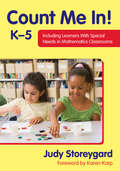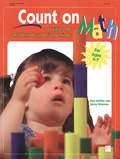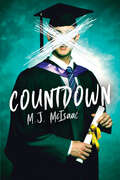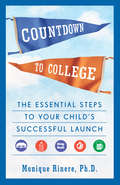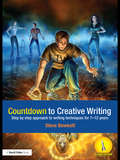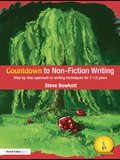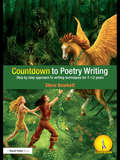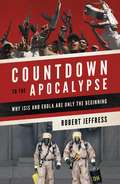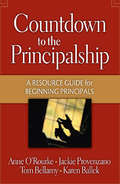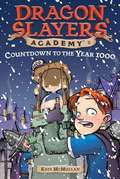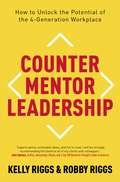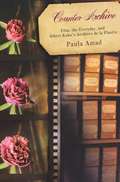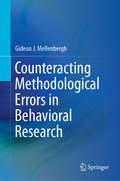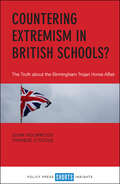- Table View
- List View
Counselling Young People: A Handbook for Trainees and Practitioners
by Louise PorterPractical and clearly written, this new book from best-selling author Louise Porter equips mental health professionals with the knowledge and skills they need to provide insightful guidance and support to children and adolescents. The book introduces exciting new models for thinking about young people’s needs, self-esteem and resilience that will invigorate counselling. It outlines the most common presenting difficulties for young people and provides clear, practical guidance on how professionals in a counselling environment can respond to these in an effective way. Offering a coherent blend of theories and practices, chapters address a wide range of emotional, social, behavioural and learning difficulties with which young people may present to counselling, such as experiences of grief and loss, anxiety and depression, disordered eating, and dealing with adversity. With an aim to empower, the book presents a non-pathologising approach to counselling that respects the skills that young people bring to working through their challenges. Accessible for professionals and trainees alike, this book is a must-have for anyone working in a counselling capacity with children and adolescents.
Counselling in Schools - A Reader
by Keith Bovair Colleen McLaughlinFirst Published in 1994. Routledge is an imprint of Taylor & Francis, an informa company.
Counselling: Approaches and Issues in Education (Routledge Library Editions: Psychology of Education)
by Helen Cowie Andrea PecherekOriginally published in 1994, the main function of this book was to provide to counsellors, trainee counsellors and teachers with pastoral care responsibilities, the knowledge and skills to support effective counselling. By drawing on their extensive pastoral and counselling experience gained in education and counselling, the authors produced a work which will also appeal to others involved in the care and protection of children and young people – including educational social workers, nurses, the police and educational psychologists. The authors integrate the development of counselling skills with a reflective stance on issues, approaches and ideas. They seek thus to increase the readers’ capacity to work sensitively and imaginatively with their clients, the sometimes troubled children and young people in primary and secondary schools.
Counselor As Consultant
by David A. Scott Chadwick W. Royal Daniel B. KissingerProviding counseling professionals with a solid grounding in the primary theories, skills, and models used by professional consultants, Counselor as Consultant is the first text that explicitly addresses the new CACREP core standards for consultation. The book’s strong focus on intentionality, reflection, and wellness helps readers develop a strong sense of counselor identity, while its structure and exercises reinforce learning. Abundant exercises and case illustrations help counselors-in-training translate theory into practice and learn the essential skills needed for consultation positions.
Counselor Education in the 21st Century: Issues and Experiences
by Jane E. Atieno Okech Deborah J. RubelThis distinctive text provides master’s- and doctoral-level students, as well as new professionals, with a thorough exploration of the range of responsibilities, working conditions, roles, evaluation criteria, benefits, and challenges experienced by counselor educators. Each chapter focuses on a key aspect of the field, including teaching; supervision; mentoring; gatekeeping; research and grant writing; tenure; adjunct, part-time, and nontenured positions; program administration; leadership; and collegiality and wellness. Case vignettes and personal narratives from counselor educators are engaging and informative, and literature reviews are useful for introducing students to the material covered. *Requests for digital versions from the ACA can be found on wiley.com. *To request print copies, please visit the ACA website here. *Reproduction requests for material from books published by ACA should be directed to permissions@counseling.org
Counselor Preparation: Programs, Faculty, Trends
by Wendi K. Schweiger Donna A. Henderson Kristi McCaskill Thomas W. Clawson Daniel R. CollinsSupported and proudly co-published by the National Board for Certified Counselors (NBCC), the largest certification organization for professional counselors in the world, the thirteenth edition of Counselor Preparation continues to be the only all inclusive, longitudinal national study of counselor preparation programs. It offers comparative data for administrative decisions and affords students and professionals the only comprehensive means available to evaluate an institution’s ability to meet personal requirements, academic needs, and career goals. This valuable resource includes: Detailed and current information on over 100 individual graduate institutions of higher education across the United States An expanded section on international programs Discussions of the counseling profession, the steps to becoming a credentialed counselor, and the various types of counseling programs available at the Master’s and Doctoral levels Chapters that critically examine the state of the profession now and predict future trends A special tribute to the Association for Counselor Education and Supervision (ACES), celebrating 60 years of contributions to the field New chapters from guest authors on the present state and future directions of ACES, the Council for Accreditation of Counseling and Related Educational Programs (CACREP), the Chi Sigma Iota Counseling Academic and Professional Honor Society International, the issues and needs of international students, and counselor training programs in Central and South America Responding Master’s and Doctoral level counselor education programs in the United States include community; mental health; clinical mental health, school; college; student affairs; career; marriage, couple and family; and counselor education and supervision. Data on each institution includes faculty and department demographics and contact information, as well as detailed information on individual programs. In addition, CACREP accredited programs, the flagship programs of counselor education, are highlighted. This is an outstanding resource for faculty, administrators, students, and practitioners alike and remains the authoritative and most comprehensive reference on counseling programs in the United States and around the world.
Counselor Self-Care
by Gerald Corey Michelle Muratori Jude T. Austin II Julius A. AustinSelf-care is critical for effective and ethical counseling practice and this inspirational book offers diverse, realistic perspectives on how to achieve work–life balance and personal wellness from graduate school through retirement. In addition to the authors’ unique perspectives as professionals at different stages of their careers, guest contributors—ranging from graduate students, to new professionals, to seasoned counselors—share their experiences and thoughts about self-care, including what challenges them most. Both personal and conversational in tone, this book will help you to create your own practical self-care action plan through reflection on important issues, such as managing stress, establishing personal and professional boundaries, enhancing relationships, and finding meaning in life.
Counselor Self-Care
by Gerald Corey Michelle Muratori Jude T. Austin II Julius A. AustinThis highly anticipated second edition written for students, clinicians, educators, and supervisors offers practical perspectives on the lifelong quest for personal wellness. Through conversational and deeply personal narratives, the authors reveal their self-care journeys at different stages of their careers, and 39 guest contributors—ranging from graduate students to counseling veterans—share how they overcome setbacks and prioritize self-care to maintain competent, ethical practice. Topics include practicing self-care throughout your career, strategies for managing stress, establishing personal and professional boundaries, enhancing relationships, finding meaning in life, and creating a realistic self-care plan. Firsthand accounts throughout the book have been updated, and new narratives have been added on self-care practices for healing from grief, self-care for grief counselors, staying committed to self-care, global self-care practices, permission to be, creating balance among chaos, making self-care nonnegotiable, contemplations at midcareer, and self-care planning. *Requests for digital versions from ACA can be found on www.wiley.com *To purchase print copies, please visit the ACA website www.counseling.org *Reproduction requests for material from books published by ACA should be directed to permissions@counseling.org
Count Girls In: Empowering Girls to Combine Any Interests with STEM to Open Up a World of Opportunity
by Karen Panetta Katianne WilliamsMaybe you have a daughter who loves cooking, soccer, and musicals. Maybe she's a social butterfly, an athlete, a fashionista, and a humanitarian who wants to change the world. Be honest—do you think, Well, she's clearly not a math and science kid? Do you assume that certain classes and careers won't appeal to her? Count Girls In challenges these assumptions and presents a totally different way of thinking: there is a place for all girls and young women—not just the science fair winners and robotics club members—in science, technology, engineering, and math (STEM) fields, if we can keep their (and our) minds and options open and meet them where they are. To succeed in STEM fields today, girls don't have to change who they are. A girl who combines her natural talents, interests, and dreams with STEM skills has a greater shot than ever before at a career she loves and a salary she deserves. Count Girls In encourages parents and other adults to raise authentic young women who have the confidence to put STEM to work in a way that best serves them and their passions. The authors, both STEM professionals, present compelling research in a conversational, accessible style and provide specific advice and takeaways for each stage of schooling, from elementary school through college, followed by comprehensive STEM resources. This isn't a book about raising competitive, test-acing girls in lab coats; this is about raising happy, confident girls who realize the world of opportunities before them.
Count Me In! K-5: Including Learners with Special Needs in Mathematics Classrooms
by Karen Karp Judy StoreygardBetween the pressure to meet standards and the overwhelming number of different learning needs of students, planning math lessons has become more complex. In this Judith Storeygard provides proven approaches to understanding the behaviors of children with special needs and effectively teaching all students.Using research-based and field-tested methodology, this book's teaching strategies include differentiated instruction, with an emphasis on co-teaching between general educators and special educators. Included are examples from teachers who have put these techniques into practice and guidelines for reproducing their successes in your classroom. Key topics include:Strategies for teaching students with autism, ADHD, and various learning disabilitiesWays to develop students' cognitive flexibilityHow to help learners plan, organize and self-monitor in mathematics classA new focus on mathematical strengths and learning ability rather than on deficits and labelsThere are numerous resources to help teachers address literacy needs, but few address mathematics. Count Me In! will bring out the full potential in all of your students-and in you as an educator.
Count Me In! K–5: Including Learners With Special Needs in Mathematics Classrooms
by Judith S. StoreygardHow to make math add up for all students Between the pressure to meet standards and the overwhelming number of different learning needs that students have, planning lessons has become more complex. Many resources help teachers address literacy needs, but few address mathematics. Using research-based and field-tested methodology, this book provides proven approaches to understanding behaviors and creating teaching programs. Key topics include: Strategies for teaching students with autism, ADHD, and various learning disabilities Ways to develop students’ cognitive flexibility How to help learners plan, organize and self-monitor in mathematics class A new focus on mathematical strengths and learning ability rather than on deficits and labels
Count on Math: Activities for Small Hands and Lively Minds
by Pam Schiller Lynn Peterson BrownThe activities in this book reflect children's real world math experiences--counting candles on a birthday cake, sorting and classifying toys, making sure there is a one-to-one correspondence between children and cookies. Children learn spatial relationships, patterning, shapes, numeration, and many other math concepts from these simple activities, such as "Nature Sort," "Human Rectangles" and "Stackable Snackables." Each chapted of this invaluable resource presents a new math concept in developmental sequence, and the activities in each chapter build on what the children have already learned. Unique features in every chapter include an introductory story, intriguing activities, evaluation criteria, and a newsletter to send home to parents. Each math concept is introduced with a story and ends with suggestions for home connections.
Countdown (Orca Anchor)
by M.J. McIsaacGolden boy Myles is being blackmailed by someone sending texts threatening to expose a secret that could change his life forever. Myles has it all: he’s popular, has an amazing girlfriend and won a full athletic scholarship to a top university. But on the day of his high school graduation ceremony, while he struggles to write his valedictorian speech, Myles receives a text that changes everything. Somehow, through text conversations in the next six hours, Myles has to discover the identity of the person threatening to reveal his darkest secret: his role in a rugby team hazing. And with so much to lose, Myles is willing to do whatever it takes to stop them. This high-interest Orca Anchor book is written specifically for teens reading below a grade 2.0 level.
Countdown to College: The Essential Steps to Your Child's Successful Launch
by Monique RinereAfter all the testing and touring and applying, your child has been accepted to college. Congratulations! Now what? Every new student grapples with making a successful transition to college—with remaining healthy, happy, grounded, and in school. Indeed, the national statistics are sobering: One in three freshmen will not come back for sophomore year, and less than 50 percent will graduate on time. A student’s adjustment is key, especially during the period starting with the lazy summer months before move-in and ending at the dizzying close of a student’s first semester. Distilling lessons and sharing stories (some cautionary, some entertaining, all helpful) from her long college advisory career, three-time Ivy League dean Monique Rinere presents a unique month-by-month road map to a college experience that is rich, rewarding, and successful for teens and parents alike. Taking parents from the moment the acceptances arrive to the end of the first college semester, her expert advice covers: • assessing the right fit among your child’s options: who and what to ask to get the real scoop on campus and academic life • understanding actual costs: considering hidden expenses, financial-aid and scholarship fine print, loans, and work-study opportunities • parenting through the senior slump so that students don’t jeopardize their hard-won college spot • talking to your child about freshman culture shock and their new freedoms around parties, food, finances, and sleep • what your child needs to know about working with an academic advisor, interacting with professors, and creating their own community of advisors • how to help your rising freshman create a conceptual bridge from what they are, a graduating high school senior, to what they want to be, a college alum • time-management and class-scheduling tips to help your child pick an appropriate class (and extracurricular) load • advice for parents facing the emptying nest: letting go of your anxieties about your child’s autonomy and seizing this opportunity to reinvent your life in new and intentional ways“A valuable and comprehensive guide for parents of college-bound students . . . The months between high school and college are a critical time, but Dr. Monique Rinere gives you confidence that everything will be all right.”—Marvin Krislov, president, Pace University
Countdown to Creative Writing: Step by Step Approach to Writing Techniques for 7-12 Years (Countdown)
by Stephen BowkettDeveloping children's writing abilities boosts their confidence, creates enjoyment and relevance in the task and cultivates a range of decision-making and problem-solving skills that can then be applied across the curriculum. The Countdown series provides all the support you need in helping children to improve their prose, poetry and non-fiction writing. Countdown to Creative Writing is a comprehensive and flexible resource that you can use in different ways: 60 stand-alone modules that cover all the essential aspects of writing a story countdown flowchart providing an overview showing how modules are linked and how teachers can progress through them with the children photocopiable activity sheets for each module that show how to make the decisions and solve the problems that all writers face along the road from first idea to finished piece of work teachers' notes for each module with tips and guidance including how modules could be used as stand-alone units, but also with suggestions for useful links between modules, and curriculum links a self-study component so that children can make their own progress through the materials, giving young writers a sense of independence in thinking about their work 'headers' for each module showing where along the 'countdown path' you are at that point. In short Countdown to Creative Writing saves valuable planning time and gives you all the flexibility you need - teachers might want to utilise either the self-study or 'countdown' aspects of the book, or simply dip into it for individual lesson activities to fit in with their own programmes of work.
Countdown to Non-Fiction Writing: Step by Step Approach to Writing Techniques for 7-12 Years (Countdown)
by Steve BowkettDeveloping children's writing abilities boosts their confidence, creates enjoyment and relevance in the task and cultivates a range of decision-making and problem-solving skills that can then be applied across the curriculum. The Countdown series provides all the support you need in helping children to improve their prose, poetry and non-fiction writing. Countdown to Non-Fiction Writing is a comprehensive and flexible resource which you can use in different ways. It includes: 37 stand-alone modules which cover all aspects of writing and understanding non-fiction texts, including the nature of language, logical thinking, recognising ‘facts’ and planning; A countdown flowchart provides an overview, showing how modules are linked and allowing teachers and pupils to track their progress; Photocopiable activity sheets for each module that show how to make decisions and solve problems which writers face on the journey to a finished piece of work; Teachers’ notes for each module with tips and guidance, including how modules can be used in the classroom, links to other modules and curriculum links, and advice on helping and guiding pupils in their writing; A self-study component so pupils can make their own progress through the material. This option gives young writers a sense of independence in thinking about their work and through offering a scaffolding of tasks, encourages confident and effective writing; 'Headers' for each module showing where along the 'countdown path' you are at that point; Contents page for quick access to particular modules and relevant aspects of writing. In short, Countdown to Non-Fiction Writing saves valuable planning time and gives you all the flexibility you need in helping pupils to prepare for, understand, and write non-fiction. The structure of the book allows teachers to utilise the modules for ‘self-study’, as a longer programme following the ‘countdown’ structure, or to dip into the book for individual lesson activities and ideas to fit in with wider programmes of study.
Countdown to Poetry Writing: Step by Step Approach to Writing Techniques for 7-12 Years (Countdown)
by Steve BowkettDeveloping children's writing abilities boosts their confidence, creates enjoyment and relevance in the task and cultivates a range of decision-making and problem-solving skills that can then be applied across the curriculum. The Countdown series provides all the support you need in helping children to improve their prose, poetry and non-fiction writing. This guide provides all the support you need in helping pupils to improve their poetry writing. Countdown to Poetry Writing is a comprehensive and flexible resource that you can use in different ways, including: stand-alone modules that cover all the essential aspects of writing a poem, including word play, use of metaphor, rhyme and many others countdown flowchart providing an overview showing how modules are linked and how teachers can progress through them with the pupils photocopiable activity sheets for each module that show how to make the decisions and solve the problems that all writers face along the road from first idea to finished piece of work teachers’ notes for modules, with tips and guidance, including how modules can be used in the classroom, links to other modules and curriculum links, and advice on helping and guiding pupils in their writing a self-study component so that children can make their own progress through the materials, giving young writers a sense of independence in thinking about their work and offering built-in scaffolding of tasks so that less experienced or less confident children get more support from the resource 'headers' for each module showing where along the 'countdown path' you are at that point. In short, Countdown to Poetry Writing saves valuable planning time and gives you all the flexibility you need - teachers might want to utilise either the self-study or 'countdown' aspects of the book, or simply dip into it for individual lesson activities to fit in with their own programmes of work.
Countdown to the Apocalypse: Why ISIS and Ebola Are Only the Beginning
by Robert JeffressISIS. Ebola. Social disorder. Religious persecution. Rampant immorality. Are these the harbingers of the biblical apocalypse, of the end of the world? If they are, what do they mean and when can we expect this to happen? In this eye-opening book, prophecy insider Robert Jeffress offers a reasoned look at these "signs" and what Jesus Christ himself meant when he talked about a future so horrendous that no human lives would be spared "unless those days were shortened" (Matthew 24.22). Did He have our time in mind? All over the world people are aware that something unprecedented in human history is about to happen. COUNTDOWN TO THE APOCALYPSE presents vital information that everyone, both inside and outside the church, needs to know to be prepared.
Countdown to the Principalship: How Successful Principals Begin Their School Year
by Tom Bellamy Jackie Provenzano Anne O' RourkeThis book displays tools and templates for planning, organizing, and monitoring a beginning principal's daily tasks.
Countdown to the Year 1000 (Dragon Slayers' Academy #8)
by Kate McmullanIt's the year 999 and the end of the world is coming--at least according to a mysterious prophecy. But then Wiglaf meets a strange boy who claims to have come from the Future, It's Zack, star of the best--selling "The Zack Files series by Dan Greenburg, and he says he's living proof that there is life after the year 1000!
Counter Mentor Leadership: How to Unlock the Potential of the 4-Generation Workplace
by Kelly Riggs Robby RiggsThis book is the result of over twenty-five years of combined experience from Kelly and Robby Riggs-dynamic, occasionally irreverent, always insightful, father (Boomer) and son (Millennial), who work with organizations grappling daily with multi-generational conflict. Through their collaboration, Kelly and Robby share their very different perspectives on the same problems most companies are STILL dealing with, but haven't had the courage or the tools, to address. Issues such as: a shocking lack of leadership skills; the culture-killing generational divide that is demolishing many companies; and the stunning, often unrecognized impact of technology on the workplace. In their "shamelessly funny, brilliantly written" debut book, Kelly and Robby will: · Discuss today's workplace dynamics, including the changes in communication modes, the influx of technology, and the impact of Millennials and Digital Natives · Explain how a one-sided approach to leadership focused on "managing" Millennials is grossly insufficient, resulting in an inability to attract and retain critical young talent· Explore the new challenges of leadership inherent with the explosion of technology-time compression, distractions, complexity and the pace of change· Reveal how old leadership challenges persist, and explore how the younger generation will expose those challenges more than ever· Detail the CounterMentor leadership model and prescribe specific tactics and techniques for addressing both old and new leadership issues
Counter-Archive: Film, The Everyday, and Albert Kahn's Archives de la PlanÈte
by Paula AmadFrom 1908 to 1931, French banker Albert Kahn financed a monumental multimedia archive intended to record the "surface of the globe as inhabited and developed by Man." Stored in a world-themed garden on the outskirts of Paris, the Archives de la Planète contained 4,000 stereoscopic plates, 72,000 autochromes, and 183,000 meters of film, composing one of the twentieth century's most impressive attempts to preserve a memory of the world through media. Moving beyond a traditional focus on fiction films screened for theatrical release, this book introduces new perspectives on motion picture history through an analysis of Kahn's rarely screened, unedited nonfiction films. Kahn's fragmented footage reveals diverse intellectual influences, including the philosophy of Henri Bergson (Kahn's lifelong mentor), the rise of human geography as practiced by Jean Brunhes (the director of the archive), and the scientific experiments of the biologist Jean Comandon (a pioneering microcinematographer who also contributed to Kahn's work). Amad also connects the Archive to an obsession with the everyday in early French film theory, the evolution of international documentary film, the early Annales School of history, and the colonial impulses of visual mapping projects. Transforming our conception of the archive in the age of cinema, Amad advances an innovative theory of film's counter-archival potential based on the challenge it poses to what counts as history.
Counteracting Methodological Errors in Behavioral Research
by Gideon J. MellenberghThis book describes methods to prevent avoidable errors and to correct unavoidable ones within the behavioral sciences. A distinguishing feature of this work is that it is accessible to students and researchers of substantive fields of the behavioral sciences and related fields (e.g., health sciences and social sciences). Discussed are methods for errors that come from human and other factors, and methods for errors within each of the aspects of empirical studies. This book focuses on how empirical research is threatened by different types of error, and how the behavioral sciences in particular are vulnerable due to the study of human behavior and human participation in studies. Methods to counteract errors are discussed in depth including how they can be applied in all aspects of empirical studies: sampling of participants, design and implementation of the study, instrumentation and operationalization of theoretical variables, analysis of the data, and reporting of the study results. Students and researchers of methodology, psychology, education, and statistics will find this book to be particularly valuable. Methodologists can use the book to advice clients on methodological issues of substantive research.
Countering Extremism in British Schools?: The Truth about the Birmingham Trojan Horse Affair
by John Holmwood Therese O'TooleIn 2014 an investigation into an alleged plot to ‘Islamify’ several state schools in Birmingham began. Known as the ‘Trojan Horse’ affair, this caused a previously highly successful school to be vilified. Holmwood, an expert witness in the professional misconduct cases brought against the teachers, and O’Toole, who researches the government’s counter-extremism agenda, challenge the accepted narrative and draw on the potential parallel with the Hillsborough disaster to suggest a similar false narrative has taken hold of public debate. This important book highlights the major injustice inflicted on the teachers and shows how this affair was used to criticise multiculturalism, and justify the expansion of a broad and intrusive counter extremism agenda.
